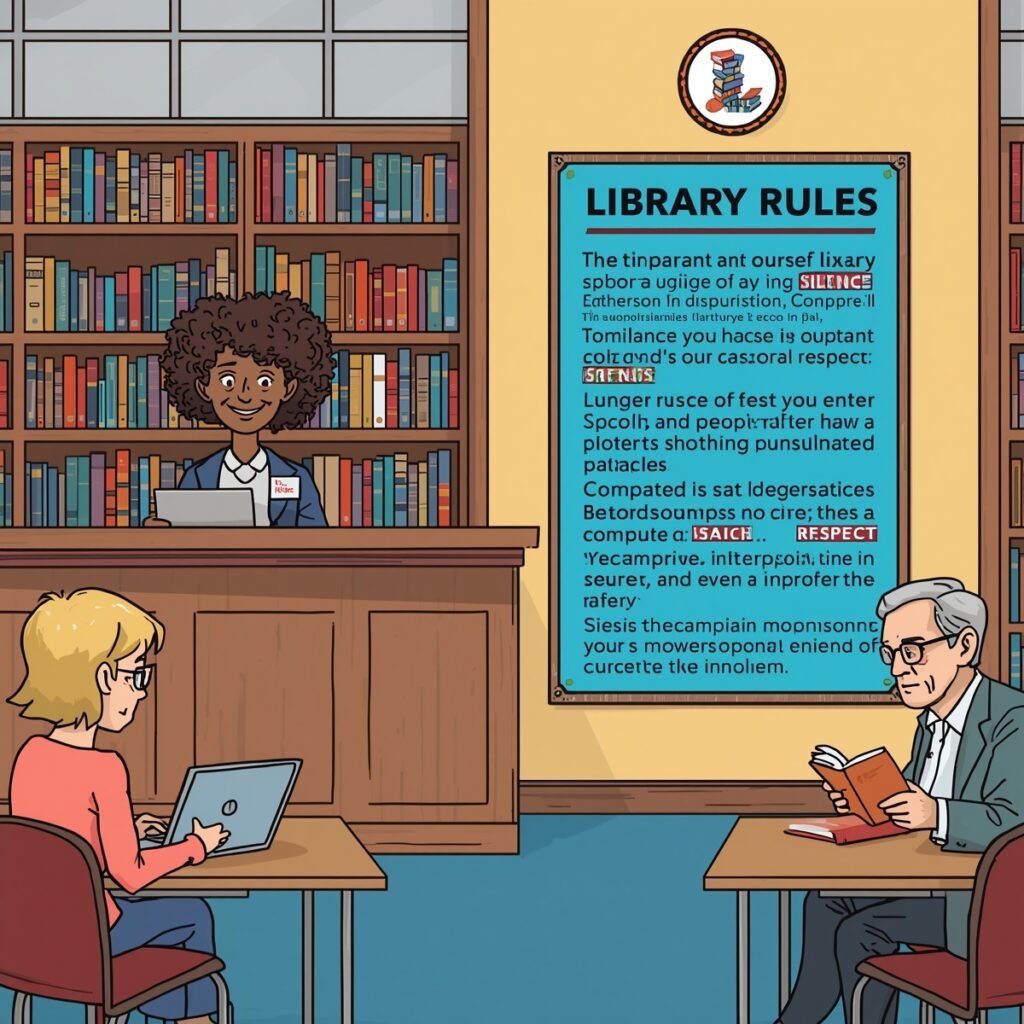Library Rules
Rules and regulations are essential for the effective management of any institution, and every library must establish its own set of guidelines to ensure proper and orderly operation. These rules help both library authorities and users understand their responsibilities and prevent any misuse of library resources.
In the field of library management, each library authority has the legal right to create specific rules and regulations tailored to its needs. As a result, the rules can vary significantly between different libraries. It is important to note that university libraries often have distinct regulations that may not be applicable to school or college libraries.
However, there are some general rules that apply to all libraries. These foundational guidelines, which promote proper and orderly library operations as part of a public welfare institution, are commonly referred to as library rules.

Factors to consider in formulating library rules:
The following factors can be considered in formulating library rules –
1. Ensuring maximum library services for all users;
2. Ensuring the security of all library assets;
3. Protecting the library’s collections from damage;
4. Ensuring the progressive development of library procedures;
5. Implementing the library’s goals and objectives
Scope of Library Rules:
A library’s regulations should reflect the following:
1. library hours;
2. Holidays;
3. Information regarding membership;
4. Borrowing right;
5. Age limit;
6. Issue of membership card;
7. Fine and penalty;
8. Number of issued books,
9. Duration of issuing books;
10. Conditions for book loan;
11. Awareness about the safety of library materials.
Standard Library Rules:
Each library has its own rules and regulations. The rules and regulations vary from library to library. However, there are some standard rules and regulations, all of which can be changed and modified according to the needs of the library and followed. The outline of the standard rules and regulations is discussed below:
1. Name of the library:
A library should be given a suitable name. No institution can be identified without naming it.
2. Timetable:
To ensure maximum use of the library facilities and resources, the timetable should be determined by considering the area users, library staff, library goals and objectives, etc. Government public libraries should be kept open from eight in the morning to nine in the evening. This timetable may vary slightly in the district areas. Government public libraries can be kept open on holidays under special arrangements. For this, special allowances can be made for the necessary officers and employees. The schedule can be set from 4 pm to 9 pm. In the case of educational institution libraries, the schedule should be set in line with the classes. However, whatever the schedule, book transaction activities should be suspended at least 30 minutes before the library closes.
3. Holidays:
Weekly holidays will continue to be observed in libraries of other institutions. However, considering the public interest, the authorities may keep the library open on the conventional weekly holidays and declare any other day as a holiday. If the library is kept open on special weekly holidays, then arrangements will have to be made for the routine employees to take leave on alternative days. Almost all libraries in the developed world, including the Library of Congress in the United States and the British Museum Library in the United Kingdom, are kept open most of the year as essential service institutions.
4. Age:
There is no age limit for adults to use the library. However, there is an age limit for children. The rules should specify the age at which children can enter the library. In public libraries, children’s education will be limited to the children’s section. And in schools and colleges, the head teacher will determine the age or class of students who can enter.
5. Access:
All members of the library will have access to the report. No one except members can enter the library. They can allow any person to enter if they need to. However, all classes of people have access. If a person is insane, mentally ill, or not dressed appropriately, the librarian may not allow him to enter the library.
6. Right to borrow books:
a) A person interested in becoming a member must apply in the prescribed form of the library;
b) A member card or subscriber card will be issued to each member;
c) The member card is not transferable.
d) The member card must be displayed at the circulation counter while issuing books;
e) If the member card is lost, the authority must be informed immediately and a duplicate card will be issued to the member after collecting a fine on the basis of the application;
f) A certain amount of books will be issued in the name of each member for a specified period;
g) If the proposal is not returned within the specified time, a fine at the prescribed rate for the additional period can be collected;
h) The issued book can be renewed a maximum of two times and the borrowed book must be submitted to the counter at the time of renewal.
i) Reference books, rare books, magazines and periodicals cannot be issued.
j) If the borrowed book is lost or any damage is done to the book, the user will be obliged to buy a new one or pay double the price.
k) The librarian can stop the issue of any book without assigning any reason or can ask the members to return the borrowed book before the due date and in that case the members will be obliged to return it.
7) Security of Library Materials:
To ensure the security of library materials, extreme precautions must be taken; as a result, strict library rules must be enforced. Special attention must be paid to ensure that no one damages the library’s books or other materials. If these are damaged overall, compensation must be sought in accordance with the rules. In this case, a new copy of the same book can be purchased, or if one is not available, the price can be doubled.
Other Important Rules:
- The library may, without giving any reason, deprive any person of the opportunity to use the library or grant special privileges.
- Every user shall be obliged to maintain the orderliness of the library.
- Personal books, magazines, sticks, umbrellas, bags, files, etc. cannot be brought into the library reading room. These can be deposited at the counter.
- No animals can be brought into the library.
- sleeping inside the library is prohibited.
- Smoking is prohibited in the library premises.
In conclusion, it can be said that the rules and regulations of the library play an important role in attracting the public to the library. Proper implementation of the rules and regulations ensures the highest library services to the users. Therefore, in order to implement the goals and objectives of the library, it is absolutely necessary for every library to formulate rules and regulations suitable for the library staff and users.



